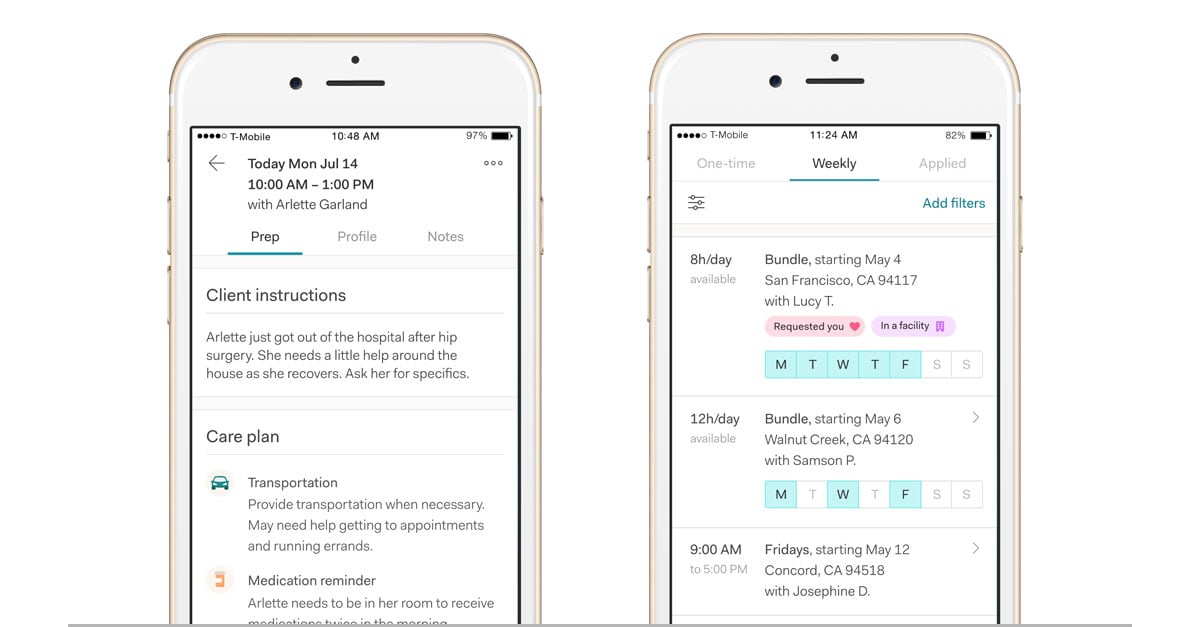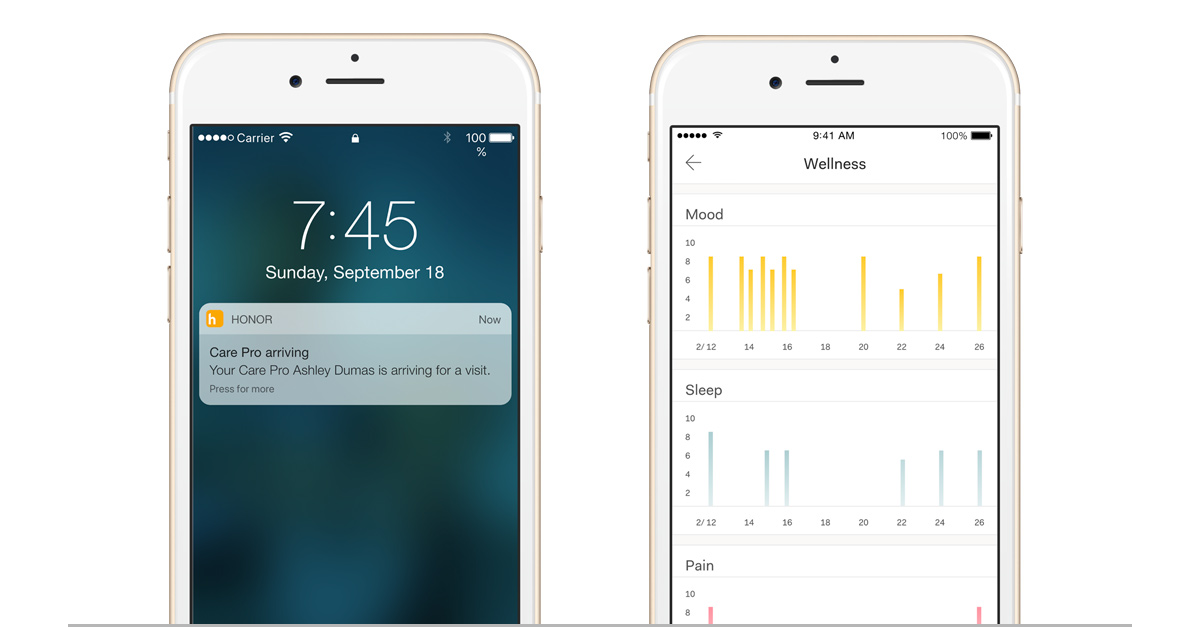By Seth Sternberg, CEO of Honor Technology, Inc. and Jeff Huber, CEO of Home Instead
In November, 2020, goPuff, a Philadelphia-based, instant delivery start-up, acquired the massive alcoholic beverage chain, BevMo. Eight months later, Uber Freight, the shipping arm of the transportation tech company, acquired Transplace, one of the largest managed transportation and logistics networks in the world. The following month, Honor, a home care tech start-up, acquired the largest home care business in the world, Home Instead.
At first blush, these sound like David and Goliath stories. But this isn't about small players defeating or devouring giant dinosaurs. It's about successful, well-funded, innovative tech start-ups and established, best-in-class companies joining forces as trailblazers. By leveraging their complementary expertise—one with incredible tech and the other with established reach—both parties are better positioned to achieve their own missions, as well as amplify each other's.
Growing More than the Bottom Line
Historically, tech start-ups were the ones being acquired when a leader in their industry plunked down a large sum of money to ensure that their leadership endures. But lately, start-ups are turning the tables on mergers and acquisitions.
And why not? With funding rounds that can land hundreds of millions of dollars for a proven start-up with a clear path forward, a thoughtful acquisition can be the express route to scaling their products and services. And for established national or global companies that understand the importance of adopting new technologies, joining forces with the developers of those technologies can catapult them onto the leading edge. But are those reasons enough for a large company to consider selling to a small start-up?
As leaders of Honor and Home Instead, we looked well beyond the numbers while we weighed our decision to move forward with our acquisition. And what we saw was that by combining our distinct strengths, we could do something much more important than grow our companies:
We could increase the
world's capacity to care.
Separately, we could continue on our individual paths to success. But together, we could accelerate the positive change that's desperately needed to meet the ballooning global demand for home care. This is why we ultimately entertained, then executed, this game-changing acquisition.
Three Signs of Smart M&A
More and more, well-funded tech start-ups will be in the M&A driver's seat. And that can be a great thing if both entities are smart about their reasons for pursuing and nurturing the relationship. Bringing together the world's largest senior care network with the most advanced care technology platform has given us perspective on what that kind of "smart" looks like.
1. Your missions are aligned. When both companies are guided by the same north star, and their vision for the future is virtually identical, the likelihood for a successful acquisition is high. Neither company has to pivot uncomfortably. Everyone, from leadership through staff, is already singing from the same song book. The collective feeling about the acquisition should be, "Yes (fist pump optional)! This will help us do that really big thing we've always wanted to do!"
Honor and Home Instead have been in total alignment on reimagining and improving the aging experience since we each opened our doors. This matters because customers continue to expect the same, if not an enhanced, experience once companies merge. So do mission-driven employees, which brings us to Sign #2.
2. Your way—and your why—of doing business are aligned. Corporate culture and employee experience are more important now than ever before. In the corporate world, employment limitations based on geography are dissolving. So employees can be lured away by any company, anywhere. And in the field, in home care specifically, the industry fragmentation and a high turnover rate for caregivers make recruiting and retention two of the biggest challenges. Both Honor and Home Instead have been committed to caring for caregivers, knowing that happy caregivers give better care. By joining forces, we'll be able to bring the technology that Honor Care Pros love to millions of caregivers, clients, and families in all 50 states and in 13 countries around the world. And we can bring more and better-matched work opportunities to caregivers around the world.
More than how we do business, Honor and Home Instead are aligned on why we're in business. Both companies were started by founders who saw the need to change home care first hand—when a loved one started needing help. And while it's tempting to view ourselves as eternally young (or at least eternally middle-aged), we know we'll also be likely to need home care in a few decades. And we want to have better aging experiences than our parents have had. So this work is personal to all of us.
3. Industry trends point to market growth that's unserviceable without new tech. Of course, numbers are important, too. Specific to Honor and Home Instead, the projected numbers for the aging population are staggering. From 2019 to 2050, the number of people age 65+ is projected to jump from 703 million to 1.5 billion. That's more than double in the span of just one generation. The only way to provide quality care for that many people is with the help of new technology. Obviously, there's no substitute for the human component of home care. But technology can actually help us be more human.
For example, Honor's technology uses our data and machine learning to help match caregivers skills and preferences with clients needs. So the caregivers can truly excel in their work and the clients can receive the care they need and deserve. How will this help enable care for more people? Happy caregivers stay with their clients longer. So we can focus on finding perfect matches for new clients instead of constantly having to re-staff for the same client. Happy caregivers are also our best ambassadors for caregiver recruitment.
 Giving caregivers agency to choose the best client fit for them has helped us improve caregiver retention.
Giving caregivers agency to choose the best client fit for them has helped us improve caregiver retention.
The second trend that informed our acquisition is the move to deliver more health care at home. This model has proven to be both viable and invaluable during the COVID-19 pandemic. Electronic health records, cloud-based computing, data storage, video conferencing, and smart technology are all making it possible for the hospital of the future to be the living room. More and more, healthcare—not just home care—for aging adults will only be offered in the comfort of their homes. And that's exactly where 90% of adults say they want to stay as they age.
 Honor technology allows for full transparency during every visit.
Honor technology allows for full transparency during every visit.
The third trend we’ve paid close attention to was Health care systems’ gradual move away from the traditional fee-for-service model and toward an outcomes-based payment model. With quality home care resulting in fewer hospital readmissions, doctors will be much more likely to recommend it for their patients.
In a lot of ways, Honor and Home Instead seemed destined to join forces. Both were founded with the mission to change the way people experience aging. Home Instead has the scale to achieve that mission. Honor has the technology to serve that scale. We’re the yin to each other’s yang. That’s why we were both so excited about the prospect of creating the world’s biggest, high-touch, high tech home care agency, together. Leaders and employees at both Honor and Home Instead are equally invested in continuing the course. And the motivation to collaborate, innovate, and achieve our joint mission is fully shared. This, in our minds, is the hallmark of smart M&A, and a much more important indicator of success than which company is buying which.



